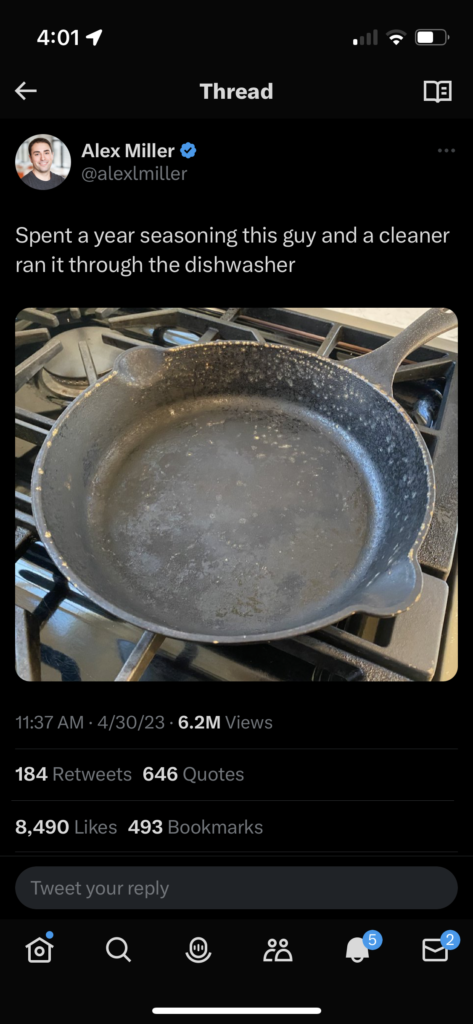My husband Alex is currently being main charactered on Twitter for posting his distress that the cleaning service we use once or twice a month put his cast iron skillet in the dishwasher.

As you will learn from a perusal of the 650 or so quote tweets, this Tweet is horror of privilege, class tensions and social inequality. Division of labor is bad and paying people to do a service you could do yourself is also (inexplicably) bad. It’s my opinion that this response is mostly fear that our capacity to earn a living through labor is diminishing. Happy International Workers Day!
Twitter has been so broken that it’s been a while since I’ve seen a context collapse happen to someone close to me. It’s been pretty fun. I’d almost forgot how ridiculous Twitter can be.
Now, of course, it’s impolite to drag someone on Twitter. But being upset that a professional fucked up a paid service is however kind of Twitter’s whole vibe. Being a cleaner is skilled work. You don’t put cast iron in a dishwasher anymore than you’d toss a wool suit in a dryer. But you can’t take knowledge for granted and Alex fucked up by leaving the pan on the stove.
Alex is sad for to have lost something he values. He is a talented chef and treats his tools with care. The seasoning came from a year of cooking. The skillet can be repaired but a year of cooking only gets replaced by a year of cooking. Loss is part of life.
But as this May Day viral Tweet indicates, any public display or experience that suggests you have privilege of any kind can quickly turn into a dim witted undergraduate seminar where it everyone is failing basic critical theory. Power is complicated.
I’m particularly amused by the jealousy on display as the reason we have a cleaner come once or twice a month is because I’m disabled. I have a chronic inflammatory spinal condition and my husband is my primary care giver. Typically disability is recognized in the wider pantheon of intersectionality as a disadvantage.
But intersectionality isn’t nearly as fun for dunking as inchoate rage. Much better to enjoy a little consequence free social opprobrium by laughing at those awful wealthy startup shitheads who pay for services. Fuck us!
I don’t desire any pity for my disability. But it would be silly to pretend that simply because we came into some money that I don’t have any problems.
Without treatment I was bedridden and unable to walk. So when we had some startup investments exit it was an relief to feel like we wouldn’t be in lifelong medical debt. We hire services as it allows us both to work. And I work because our medical bills are insane. Fun loop right?
Whatever you take away from this, I’d argue it’s good to care about power, community, skills, disability, labor and ending the culture wars. I’m glad this happened on May Day. We will continue pay a living wage to our skilled service providers. We are lucky it’s within our means. We pay $150 for three hours and we will continue to put our money into our community because that’s the whole point of rich assholes. Now go watch some Downtown Abbey.